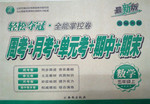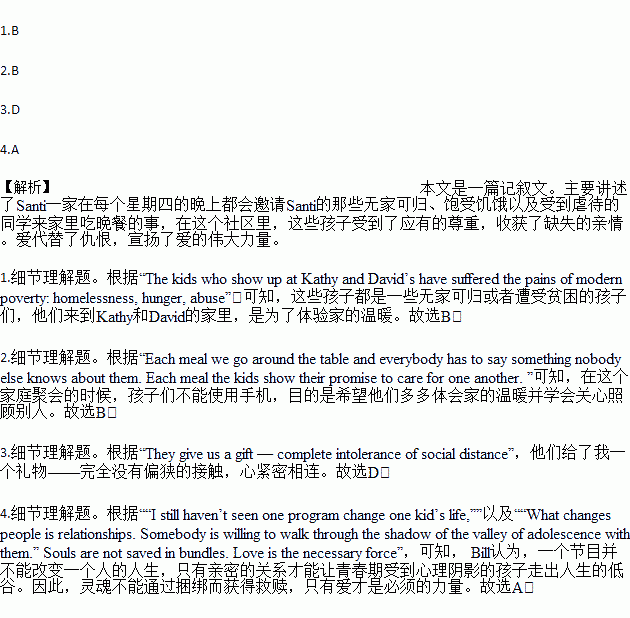题目内容
Kathy Fletcher and David Simpson have a son named Santi. He had a friend who sometimes went to school hungry. So Santi invited him to occasionally eat and sleep at his house.
That friend had a friend and that friend had a friend, and now when you go to dinner at Kathy and David’s house on Thursday night there might be 15 to 20 teenagers gathering around the table, and later there will be groups of them crashing in the basement or in the few small bedrooms upstairs. The kids who show up at Kathy and David ’s have suffered the pains of modern poverty: homelessness, hunger, abuse.
And yet by some miracle, hostile soil has produced beautiful flowers. Kids come from around the city. Spicy chicken and black rice are served. Cellphones are banned. The kids who call Kathy and David “Momma” and “Dad,” are polite and clear the dishes. Birthdays and graduations are celebrated. Songs are performed. Each meal we go around the table and everybody has to say something nobody else knows about them. Each meal the kids show their promise to care for one another.
The adults in this community give the kids the chance to present their gifts. “At my first dinner, Edd read a poem that I first thought was from Langston Hughes, but it turned out to be his own. Kesari has a voice that somehow appeared from New Orleans jazz from the 1920s. Madeline and Thalya practice friendship as if it were the highest art form.”
“They give us a gift — complete intolerance of social distance. When I first met Edd, I held out my hand to shake his. He looked at it and said, “We hug here,” and we’ve been hugging since.”
Bill Milliken, a veteran youth activist, is often asked which programs turn around kids’ lives. “I still haven’t seen one program change one kid’s life,” he says. “What changes people is relationships. Somebody is willing to walk through the shadow of the valley of adolescence with them.” Souls are not saved in bundles. Love is the necessary force.
1.Why do kids come to Kathy and David’s house on Thursdays?
A. To help the homeless at first hand.
B. To experience the feeling of home.
C. To learn about the modern poverty.
D. To plant beautiful flowers in poor soil.
2.Why isn’t the use of cell phones allowed at Thursday dinners?
A. Kids need to tell stories about themselves.
B. Kids are expected to care more for each other.
C. Kids have to do house chores around the home.
D. Kids prepare songs for birthdays and graduations.
3.What gift did the writer get at a Thursday dinner?
A. The practice of the art form.
B. The pleasure of enjoying jazz.
C. The chance to listen to poems.
D. The zero distance between souls.
4.What does Bill mean in his words?
A. Love is the power to change a kid’s life.
B. Money is needed to start programs for kids.
C. A program can change a group of kid’s lives.
D. Kids change their relationships in a program.
 轻松夺冠全能掌控卷系列答案
轻松夺冠全能掌控卷系列答案
